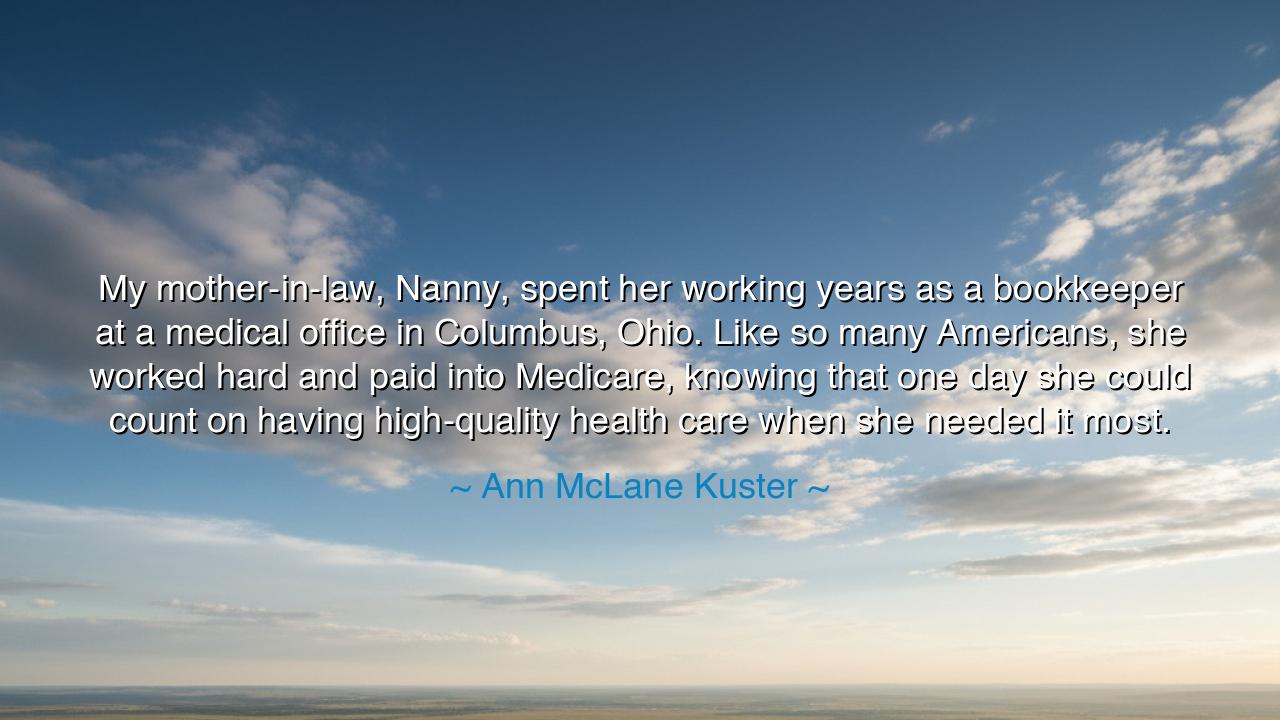
My mother-in-law, Nanny, spent her working years as a bookkeeper
My mother-in-law, Nanny, spent her working years as a bookkeeper at a medical office in Columbus, Ohio. Like so many Americans, she worked hard and paid into Medicare, knowing that one day she could count on having high-quality health care when she needed it most.






When Ann McLane Kuster spoke the words, “My mother-in-law, Nanny, spent her working years as a bookkeeper at a medical office in Columbus, Ohio. Like so many Americans, she worked hard and paid into Medicare, knowing that one day she could count on having high-quality health care when she needed it most,” she did not merely tell a family story. She gave voice to the collective hope and sacrifice of a people — the belief that years of honest labor will one day yield dignity, security, and care in life’s final chapters. Her words rise as a hymn to fairness, to the covenant between citizen and nation.
The meaning of this quote is found in its simplicity: those who work hard and give faithfully to society deserve to be cared for when their strength wanes. Nanny, a bookkeeper, may not have stood in the spotlight, but her toil was essential, and her faith in the promise of Medicare was the same faith shared by millions. The truth Ann McLane Kuster speaks is this: the measure of a nation is found in how it tends to its elders, those who have borne its burdens in their youth and now await its protection in their age.
The origin of such programs, like Medicare, lies in the struggles of past generations who endured poverty, sickness, and neglect in their later years. Before such safety nets, countless elders worked until death or fell destitute, abandoned in their infirmity. It was through sacrifice and political courage that societies created systems to honor their aged — a modern reflection of the ancient commandment: “Honor thy father and thy mother.” What Kuster describes in her mother-in-law’s life is the fruit of this legacy, the assurance that labor would not end in despair, but in care.
History gives us many examples of this sacred principle. In the Roman Republic, veterans who had given their strength to the state were granted land and pensions, recognizing that their service bound the Republic in debt to them. When this covenant was broken, unrest shook the empire. Likewise, in modern times, when societies forget their duty to the aged, bitterness and despair grow like weeds. But when they uphold this covenant, as Nanny believed her country would, then trust flourishes and the people find strength in unity.
Kuster’s words are also a reminder of gratitude. She does not merely speak of her mother-in-law’s diligence; she elevates her story as an emblem of millions. The tale of Nanny is the tale of every unseen worker, of every quiet laborer whose hands keep the nation alive. Her faith in Medicare was not only personal but collective — a trust that her years of giving would not vanish into nothing, but would return to her in the form of health care when her need was greatest.
The lesson for us is clear: work and duty are not in vain, but society must keep its promises. The worker must labor with honesty, and the nation must respond with justice. If one side fails, the bond breaks, and hope falters. But when both fulfill their part — the citizen contributing faithfully, the state honoring that sacrifice — then a foundation of trust is built, strong enough to endure storms.
Practical actions flow from this teaching. As individuals, we must honor the labors of those before us, support systems that care for the vulnerable, and ensure that we do not abandon our elders to loneliness or neglect. As a society, we must guard programs like Medicare, strengthening rather than weakening them, remembering always that they are not charity but a rightful return on decades of work and sacrifice.
Thus, Kuster’s words stand as both tribute and warning: tribute to her mother-in-law, who labored in quiet faith, and warning to us all that the covenant of care must never be broken. May future generations remember that a people’s greatness is measured not only by its wealth or power, but by how it treats those who gave their lives in service to it. For in honoring the aged, we honor the very soul of our civilization.






AAdministratorAdministrator
Welcome, honored guests. Please leave a comment, we will respond soon